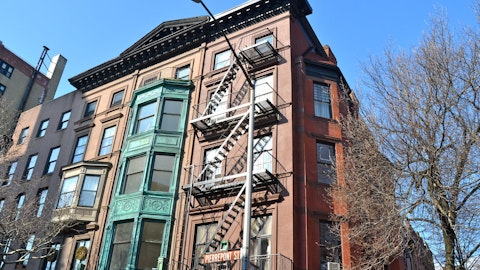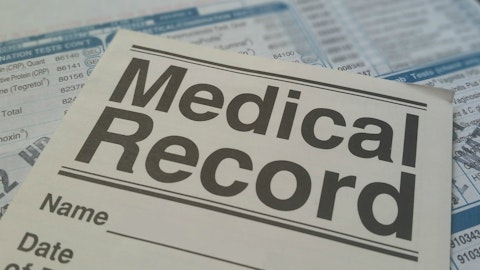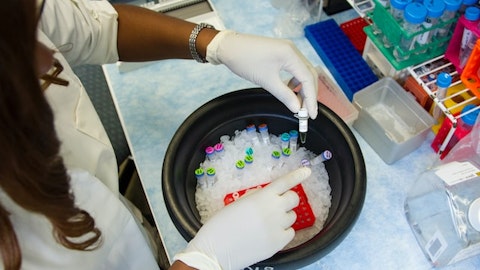Juan Sanabria: Great. And then Bob, you gave some general parameters, I think I think about ’24. So how should we think about occupancy over the next kind of 5 quarters or so, I think you had expect maybe some nonrenewals in the fourth quarter, if you can correct me if I’m wrong there, and just expectations into ’24 for upcoming maturities on leases.
Robert Kiernan: Yes, Juan. So yes, we expect our fourth quarter occupancy to be right around 96.5% right in that — in that ballpark. And then as we look ahead to 2024, we’re looking at our renewals to be really tracking very similarly to how we did this year. Somewhere in that 80% to 85% type range on both square feet and on ABR as we look at 2024 right now. And so what that would be from an overall occupancy, it would be in this — if it ticked down, it depends on absorption — maybe as a floor, think of 96%, a high 95% as maybe where it could trend on the low side. But I think we feel very confident in how we are trending for 2024.
Operator: Our next question comes from Rob Stevenson with Janney.
Robert Stevenson: Just to follow up on that last question. Can you talk about how much demand you’re seeing for incremental space today? I mean relative to the last few years, is it harder, easier about the same in terms of backfilling vacancy and the demand for expansions from tenants?
Jeffery Busch: Yes, I would say we keep back filling vacancy. It may even be a little bit better than last year. We’re finding tenants, we feel in some challenging ones. You always have some 1 — smaller ones that have been challenging, they have been sitting for a couple of years. We solved that this year. I’m encouraged that medical office is growing. I mean we’re not doing much with the expansion. I think it’s because cost of capital right now. But we are seeing that a lot of our long term, they were small. But longer term, we’ve been finding that we’re leasing them up. So I’m very encouraged about the leasing. And going forward, the same thing. We hear of somebody who is moving out and then we hear relatively quickly a replacement. So the market seems to be okay in that terms. If we do in 2024 lose some tenants, I expect that we’ll fill them up relatively quickly.
Robert Stevenson: Okay. That’s helpful. And I think you might have a small Genesis Care asset. Has that been resolved as of yet? Or is that process still ongoing?
Robert Kiernan: We really didn’t have any significant exposure, Rob, to Genesis. I mean whatever we did have, I think, was something that was moving out in the fourth quarter. And so nothing — there’s really nothing material from an impact perspective on our portfolio.
Robert Stevenson: Okay. And I guess, Bob, that leads me to — other than the impact of any acquisitions, dispositions and higher rates, is there anything else that’s either carrying over from the third quarter positively or negatively earnings-wise or alternatively going away that we should be thinking about when factoring in into our models?
Robert Kiernan: No, nothing significant, really, if I bridge the third to the fourth quarter. The third quarter was very consistent if you kind of think back from a trend perspective after the dispositions, flow, I think, very predictably. And I don’t think there’s anything really too unusual that I mentioned, the occupancy expectations for the end of the year. But otherwise, the trends relative to our — to where we are going from a rent perspective, from an interest perspective is teed up, and I think really nothing unusual expected.
Robert Stevenson: Okay. And when during the quarter did the sale happen, how much of the NOI off of that, did you wind up recognizing in the third quarter?
Robert Kiernan: Just 1 month of that — it was really…
Operator: Our next question comes from Alex Kubicek with Baird.
Alexander Kubicek: The first one is relating to that 90 basis points of expiring leases. You mentioned that 80% of the space will be renewed and 86% of ABR, curious what kind of lease escalators you’re able to get with those tenants today?
Jeffery Busch: We’ve been averaging 2.5% on our portfolio with lease escalators. Remember most of our triple net absolute net. Most of our properties are triple net absolute net, but they’re really paying the expenses of the inflationary expenses — so we get 2.5% beyond that. .
Alexander Kubicek: Is that 2.5% changed at all from the beginning of the year to now?
Jeffery Busch: Yes. Actually, it’s been going up I mean our overall portfolio was running around 2.1%, and we’re seeing now about 2.5% in the renewal type of piece.
Alexander Kubicek: Second question is, how are your tenants performing? And are there any change to the watch list?
Robert Kiernan: Yes, there’s been no — yes, no significant changes relative to tender performance. We’ve had a real solid tenant performance over the last year. So nothing notable.
Alexander Kubicek: All right. Good to hear — last one for me is how much of the investment pipeline comes from new relationships versus existing ones?
Alfonzo Leon: I don’t have a precise data on that. I mean it’s pretty varied. And we cast a pretty wide net — but I’d say, on average, about 1/3 of what we see is from new sources.
Operator: Our next question comes from Bryan Maher with B. Riley Securities.
Bryan Maher: Just two quick ones for me. Maybe for Jeff or Bob. On the dividend, and I asked this before, prior quarters that [indiscernible] out there, again, with the elevated payout ratio relative to FFO or FAD — we know it improves organically in 2024 and 2025. And I suspect that if you make accretive acquisitions that only gets better, but not worse, but we get a lot of questions from shareholders and advisers that, that dividend is safe at current levels. Is it your thought that the Board holds the line at the $0.21 dividend?




